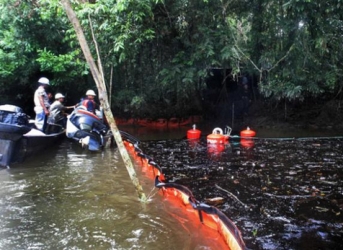Chevron is revered in Wall St. and City of London for its massive abilities as a money machine. Last year Chevron, the United States’ largest oil and gas company after ExxonMobil, boosted its revenues by an impressive 25% over FY 2010 to $245.6 billion. Of even greater interest to Chevron shareholders, profits soared by 41% to $26.9 billion. Little wonder then that Chevron CEO and chairman John Watson strolled home with roughly $25 million in total compensation in 2011, a 52% increase over his 2010 pay, according to Chevron's securities filing.
2012 and the next couple of years also promise to be fiscal bonanzas for the firm, as oil and natural gas projects in Australia, Africa and the Gulf of Mexico all begin to come online.
There is only one, or rather three, small clouds on this otherwise sunny horizon – Ecuador, Brazil and Indonesia have all brought lawsuits against Chevron for its cavalier environmental and fiscal policies. In the case of Ecuador and Brazil, the countries are seeking massive indemnities for rampant pollution at Chevron’s sites, while Indonesia is accusing the oil giant of establishing a fictitious green project scam that cost the state $270 million.
It’s enough to make an executive forswear his three martini lunch. Not surprisingly, Chevron is denying all charges.
In Indonesia on 17 March Indonesian government accused five Chevron employees of fraud involving a fictitious green project involving the Green Planet Indonesia and Sumigita Jaya companies that lost the state $270 million, stating that "The Attorney-General's Office (AGO) has named seven suspects, five of whom are from Chevron."
Chevron’s take on its presence in Indonesia? “Chevron is a major partner in Indonesia's economy and an active member of the community. Through our wholly owned subsidiary PT Chevron Pacific Indonesia, we are the largest producer of Indonesia's crude oil. We are searching for new crude oil and natural gas reserves from central Sumatra to offshore East Kalimantan. We continue to innovate with new technologies that are used to sustain and enhance production from existing reservoirs. Our geothermal operations in Indonesia help make Chevron the largest producer of geothermal energy in the world.”
In any case, no major harm done… on 15 May Indonesia’s upstream oil and gas authority BPMigas reported that the agency had approved plans of development (POD) for eight oil and gas fields including the Duri concession, leased by Chevron Pacific Indonesia.
But Chevron’s overseas profit “perfect storm” may yet emerge in the southern Atlantic.
South of the border, Chevron is battling a lawsuit brought by Ecuador. Beginning in 1964, Texaco and its joint venture partner Petroecuador dumped nearly 16 billion gallons of oil waste products into the Amazonian rainforest, spilling nearly 17 million gallons of oil from its trans-Ecuadorian pipeline operation between 1971 and 1991. As Chevron merged with Texaco in 2001, Ecuador is seeking justice from Chevron, with Ecuadorean indigenous groups suing Chevron for the environmental damage.
Last year an Ecuadorean court ordered Chevron to pay $9.5 billion in remediation costs and plaintiff damages and an additional $8.6 billion if it refused to apologize for the alleged environmental damage and has since filed charges in a Canadian court. The issue has moved from the courts to the boardroom, as on 30 May an activist shareholder group led by New York State Comptroller Thomas P. DiNapoli urged Chevron to settle the legal battle in Ecuador, saying it has hurt indigenous people in Ecuador and damaged Chevron’s reputation.
Watson fired back, accused the Ecuadorean plaintiffs’ attorneys of fraud and said that although the company lost in an Ecuadorean court, an international court in the Netherlands has ruled in Chevron’s favor and Chevron later issued a statement in response to the new lawsuit in Canada, saying “the Ecuador judgment is a product of bribery, fraud, and it is illegitimate. The company does not believe that the Ecuador judgment is enforceable in any court that observes the rule of law.”
But, whilst the Indonesia case is “chump change” and Ecuador’s protest can be dismissed as history, Chevron faces a potential Everest of problems in one of the world’s most promising markets, Brazil’s offshore oil fields.
On 21 March Federal prosecutors in Rio de Janeiro charged Chevron and 17 executives of "environmental crime" in connection with a major spill off southeastern Brazil on 23 November 2011 of 2,400 barrels of crude, which led authorities to suspend all of Chevron's drilling operations and to deny the company access to huge new offshore fields.
Moving forward, in April Brazilian judge Vlamir Costa Magalhães advanced a criminal case against Chevron and drilling-rig operator Transocean to a different court in Rio de Janeiro, with Brazilian prosecutors instituting a civil lawsuit seeking damages of roughly $11.2 billion.
ADVERTISEMENT
The local prescribes Chevron CEO Watson as "a man of short temper and a history of friction with company shareholders."
While Indonesia as a static if not declining market and the Ecuadorian case is history; potentially being locked out of the development of Brazil’s offshore oil fields, which Spanish oil giant Repsol described as “One of the areas with the highest hydrocarbon reserves growth in the world,” is not a happy prospect for Chevron.
Perhaps it’s time to time to fess up to the authorities in Indonesia and pay off Texaco’s sludge tab, if America’s second largest energy concern wish to remain a major player in Brazil? In such a case, perhaps Chevron CEO Watson will have to be satisfied with a 2012 pay of a mere $25 million as chevron pays its debts.
By. John C.K. Daly of Oilprice.com


















